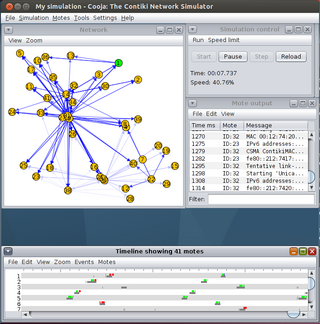A real-time operating system (RTOS) is an operating system (OS) for real-time computing applications that processes data and events that have critically defined time constraints. An RTOS is distinct from a time-sharing operating system, such as Unix, which manages the sharing of system resources with a scheduler, data buffers, or fixed task prioritization in a multitasking or multiprogramming environment. Processing time requirements need to be fully understood and bound rather than just kept as a minimum. All processing must occur within the defined constraints. Real-time operating systems are event-driven and preemptive, meaning the OS can monitor the relevant priority of competing tasks, and make changes to the task priority. Event-driven systems switch between tasks based on their priorities, while time-sharing systems switch the task based on clock interrupts.

QNX is a commercial Unix-like real-time operating system, aimed primarily at the embedded systems market. QNX was one of the first commercially successful microkernel operating systems.

AVR is a family of microcontrollers developed since 1996 by Atmel, acquired by Microchip Technology in 2016. These are modified Harvard architecture 8-bit RISC single-chip microcontrollers. AVR was one of the first microcontroller families to use on-chip flash memory for program storage, as opposed to one-time programmable ROM, EPROM, or EEPROM used by other microcontrollers at the time.

Contiki is an operating system for networked, memory-constrained systems with a focus on low-power wireless Internet of Things (IoT) devices. Contiki is used for systems for street lighting, sound monitoring for smart cities, radiation monitoring and alarms. It is open-source software released under the BSD-3-Clause license.
The LynxOS RTOS is a Unix-like real-time operating system from Lynx Software Technologies. Sometimes known as the Lynx Operating System, LynxOS features full POSIX conformance and, more recently, Linux compatibility. LynxOS is mostly used in real-time embedded systems, in applications for avionics, aerospace, the military, industrial process control and telecommunications. As such, it is compatible with military-grade security protocol such as wolfSSL, a popular Transport Layer Security (TLS/SSL) library.
Micro-Controller Operating Systems is a real-time operating system (RTOS) designed by Jean J. Labrosse in 1991. It is a priority-based preemptive real-time kernel for microprocessors, written mostly in the programming language C. It is intended for use in embedded systems.

FreeRTOS is a real-time operating system kernel for embedded devices that has been ported to 35 microcontroller platforms. It is distributed under the MIT License.
Azure RTOS ThreadX is a highly deterministic, embedded real-time operating system (RTOS) programmed mostly in the language C.
TI-RTOS is an embedded tools ecosystem created and offered by Texas Instruments (TI) for use in a range of their embedded system processors. It includes a real-time operating system (RTOS) component named TI-RTOS Kernel, networking connectivity stacks, power management, file systems, instrumentation, and inter-processor communications like DSP/BIOS Link. It is free and open-source software, released under a BSD license.

ChibiOS/RT is a compact and fast real-time operating system supporting multiple architectures and released under a mix of the GNU General Public License version 3 (GPL3) and the Apache License 2.0. It is developed by Giovanni Di Sirio.
BeRTOS is a real-time operating system designed for embedded systems.
Ethernut is an open source hardware and software project for use as an embedded-Ethernet-system.

QP is a family of open source real-time embedded frameworks (RTEFs) and runtime environments based on active objects (actors) and hierarchical state machines. The QP family consists of the lightweight QP/C and QP/C++ frameworks, written in C (C99) and C++ (C++11), respectively.

T-Kernel is an open source real-time operating system (RTOS) designed for 32-bit microcontrollers. It is standardized by the T-Engine Forum, which distributes it under a T-License agreement. There is also a corresponding Micro T-Kernel (μT-Kernel) implementation designed for embedded systems with 16-bit or 8-bit microcontrollers.
Mbed is a platform and operating system for internet-connected devices based on 32-bit ARM Cortex-M microcontrollers. Such devices are also known as Internet of Things devices. The project is collaboratively developed by Arm and its technology partners.
OpenTag is a DASH7 protocol stack and minimal Real-Time Operating System (RTOS), written in the C programming language. It is designed to run on microcontrollers or radio Systems on a Chip (SoC). OpenTag was engineered to be a very compact software package. However, with proper configuration, it can also run in any POSIX environment. OpenTag can also provide all functionality required for any type of DASH7 Mode 2 device, rather than just the eponymous “tag”-type endpoint device.

Rodos is a real-time operating system for embedded systems and was designed for application domains demanding high dependability.

RIOT is a small operating system for networked, memory-constrained systems with a focus on low-power wireless Internet of things (IoT) devices. It is open-source software, released under the GNU Lesser General Public License (LGPL).

Apache Mynewt is a modular real-time operating system for connected Internet of things (IoT) devices that must operate for long times under power, memory, and storage constraints. It is free and open-source software incubating under the Apache Software Foundation, with source code distributed under the Apache License 2.0, a permissive license that is conducive to commercial adoption of open-source software.









